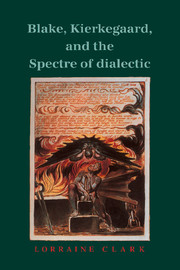Book contents
- Frontmatter
- Contents
- Acknowledgements
- A note on texts and abbreviations
- Introduction
- 1 The Spectre and the logic of error
- 2 The Spectre as Kierkegaard's concept of dread
- 3 The Spectre and the line of life
- 4 Mastered irony as the ground of human community
- 5 Irony and authority
- Conclusion. Los and the Spectre: master and slave in the labor of the negative
- Notes
- Bibliography
- Index
Conclusion. Los and the Spectre: master and slave in the labor of the negative
Published online by Cambridge University Press: 19 January 2010
- Frontmatter
- Contents
- Acknowledgements
- A note on texts and abbreviations
- Introduction
- 1 The Spectre and the logic of error
- 2 The Spectre as Kierkegaard's concept of dread
- 3 The Spectre and the line of life
- 4 Mastered irony as the ground of human community
- 5 Irony and authority
- Conclusion. Los and the Spectre: master and slave in the labor of the negative
- Notes
- Bibliography
- Index
Summary
Los compelld the invisible Spectre
To labours mighty, with vast strength, with his mighty chains,
In pulsations of time, & contentions of space, like Urns of Beulah
With great labour upon his anvils [;] & in his ladles the ore
He lifted, pouring it into the clay ground prepar'd with art;
Striving with Systems to deliver Individuals from those Systems
Blake, JerusalemDoubts are always pernicious Especially when we Doubt our Friends Christ is very decided on this Point. “He who is Not with Me is Against Me” There is no Medium or Middle State
& if a Man is the Enemy of my Spiritual Life while he pretends to be the friend of my Corporeal he is a real Enemy
Blake, Letter to Mr. Butts, April 15, 1803While Socrates politely and indirectly took away an error from the learner and gave him the truth, speculative philosophy takes the truth away politely and indirectly, and presents the learner with an error.
Johannes Climacus, Concluding Unscientific PostscriptIn his battle to master the Spectre, Blake's Los labors “negatively” to cast off all spectral abstractions from life: to consolidate these spectral abstractions as inaction, negation, irony, and error. But beyond this corrosively negative exposure of error, Los labors to actualize a living truth of action and life, a full and positive presence of sorts which stands revealed beyond that negative exposure. This presence is by definition virtually impossible to figure or symbolize concretely, for to do so would be to impose a new consolidation of error dogmatically tyrannizing over life.
- Type
- Chapter
- Information
- Blake, Kierkegaard, and the Spectre of Dialectic , pp. 174 - 200Publisher: Cambridge University PressPrint publication year: 1991



